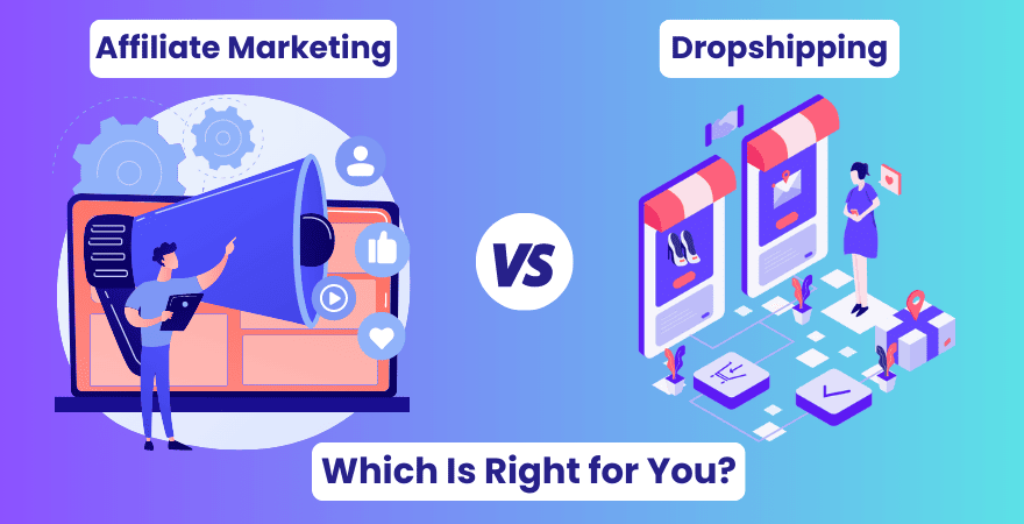Getting the word out about your brand is one of the most pressing problems business owners face today, especially in a competitive online landscape. Fortunately, there are lots of solutions to grow through the use of affiliate marketing vs referral marketing. Both are sustainable practices you can implement repeatedly, but which is better?
If you are thinking about launching affiliate and referral programs, you should know when to employ each and what it will ultimately cost you. This guide will walk you through everything you need to know to decide which is right for your brand.
Let’s dive in.
Affiliate Marketing vs Referral Marketing: Major Differences

The first major difference between affiliate and referral marketing is how a lead comes to you. An affiliate is typically another brand or influencer who markets your product on their platform. Their audience may or may not know them in real life. Referral marketing gets people to your brand by referring people your existing customers already know.
Another major difference is the payment method for both affiliate programs and referral programs. An affiliate referral program typically pays out in cash, whereas referral marketing may pay in rewards, free products, or discounts.
In both cases, you will pay for a successful referral but the marketing strategy is different for both. Let’s take a closer look at what you can expect from both and how you can implement affiliate and referral marketing programs.
What is Affiliate Marketing?

Affiliate programs rely on influencers and other avenues to relay the news of your outstanding product or service to their unique audience. The marketing person (the affiliate) is paid for their work based on the number of leads they generate or the sales they secure for you.
They must share your content on their social media platforms, YouTube channels, or blogs. They might post an honest review of your goods or service, putting you in front of a much wider audience. Because they are already known, liked, and trusted by their audience, some authority will transfer to you.
It’s important to note here that your affiliate marketer doesn’t necessarily know their audience on a more personal level. This is the key difference between an affiliate program and a referral program.
How to Implement Affiliate Marketing
The only real requirement for your affiliate program is to create personalized links for each affiliate you welcome into the program. This allows you to track who is making what sale and allows you to pay out the correct amount at the end of the month or quarter.
Of course, you will have to pinpoint brand advocates who can do your product or service justice. Make sure you interview or collect data from interested parties to check for alignment with your industry and the reputation of your brand. This also helps you to find more successful referrals instead of watering down your message.
Be sure to see our guide here on how to create an affiliate program.
If you don’t necessarily want to run your affiliate programs, you can register your brand through other companies like CJ Affiliates.
What is Referral Marketing?

Referral marketing is fairly similar to affiliate programs, but it has one major difference: they have a real personal connection with your brand and are marketing it to people they know in real life. Referral programs work by encouraging existing customers to share your business with their friends and family members directly.
They may not post it on their blog or even share it on social media. It could be far more targeted than that, sending your information to the specific people they think could benefit from your services.
You have a much higher chance of closing a sale via a referral program, but the reach is less than expected with affiliate programs. Still, these marketing strategies shouldn’t be overlooked when expanding your audience.
How to Implement Referral Marketing
Implementing a referral program might be a little more cumbersome, but that doesn’t mean you should immediately turn away. Referral programs require you to keep track of points, bonuses, and all of the goodies you deliver to your brand ambassadors for doing your marketing for you.
CRM software can go a long way toward making your referral program more robust without letting any details slip through your fingers. Things you will want to track include:
- Referrals and who referred them to you
- Dates of referrals
- Sales conversions from referrals
- Next step is to follow up with them and nurture them to close a sale
Don’t forget some of these best referral program ideas here!
Overlap Between Affiliate Marketing vs Referral Marketing
While there are some serious differences between affiliate marketing vs referral marketing, it should be clear at this point that there is some overlap, too. Here is what you should know about your affiliate and referral programs and how to implement these marketing strategies effectively.
Know, Like, and Trust Factors Play a Role

People are more likely to buy something recommended to them by someone they already know, like, and trust. This could be someone they follow online, even if they have never met them in real life, as is the case for most affiliate programs. Personal recommendations through referral programs work in the same way.
Whether it comes through someone they admire or know in real life, they are already warmed up to buying from you.
More than 90 percent of people trust referrals from people they know, so pay attention to how your new customers come to you.
Consistency is Key
No matter which method you choose for your marketing efforts, consistency is the key. A single affiliate partner or referral link isn’t likely to help you move the needle forward. You will have to be diligent about signing up new and qualified affiliate partners and encouraging existing customers to refer you to others.
You will only see your affiliate or referral marketing program take off with sustained effort.
Cost-Effective Compared to Broad Ad Campaigns

The good news is that referral marketing and an affiliate program are more cost-effective than you would find with a broader ad campaign. Why are your marketing dollars better spent on affiliate and referral programs? In a nutshell, it’s because you only pay for conversions into new customers.
Affiliates are paid based on their sales volume or per lead, they secure for you. Referral partners are only paid in your reward programs when they bring another customer into the fold.
On the other hand, advertisements to help get you to the top of the SERPs can drain your budget and may not move the needle forward in the same way.
Grow an Audience of Loyal Customers
Once someone enters into your brand’s ecosystem, your goal should be to delight and impress them. Both affiliate and referral programs can create an army of loyal customers that will stick with you for the long haul. It increases sales and retention, especially referral marketing.
Tracking a Referral or Affiliate Link

The last similarity between affiliate marketing and a referral program is that you must track both the affiliate link and the referral link. This is how you know who is referred by whom and can cue you to issue payment, rewards, or discounts to the right person.
This might seem tedious to some, but it’s a mandatory component of both.
Benefits of Affiliate Marketing vs Referral Marketing
Of course, there are some times when an affiliate program might win out over referral marketing. See if any of these benefits appeal to your brand.
Wider Audience Reach with an Affiliate Program

One of the downsides of a referral program is that you can only reach people in the circle of influence of your existing customers. On the other hand, an affiliate has an audience who is ready and waiting to take their recommendations for products to buy.
While it might seem prudent to contract with any affiliate interested in your brand, you might find it helpful to have guidelines about who you will and will not accept into the program. You can do this with audience requirements to maximize your reach.
Low Overhead Costs (But More Out of Pocket Costs)

An affiliate program is typically very inexpensive to start, making it appealing to businesses that don’t have much money to get started.
All you need to do is create a unique affiliate link for each influencer who partners with you.
The downside is that you may have more out-of-pocket costs. Affiliate programs pay their affiliates in cash for the leads or sales.
While you might be bringing more money in because of their marketing, it might also put a huge dent in your bottom line.
Focus on Advertising over Personal Recommendation

Affiliate programs are great because they allow you to focus more on your advertising efforts instead of convincing your existing customers to refer a friend. Advertising is impartial and allows you to best use an influencer’s market share.
Keep tabs on what marketing tactics you allow for your affiliates (videos, social media, blogs, etc.). All are important, but you may prefer one medium over another based on the conversion data for your unique field.
When is Referral Marketing Better?
While an affiliate program might be a great option for some brands, a more grassroots effort, like a referral program, could be the better fit. Here are a few reasons why referral programs should earn a second look.
No Cash Payments (Offer Discounts Instead)

Perhaps the most important reason referral programs should be a part of your marketing strategy is because they don’t always have to cost you directly.
A successful referral doesn’t demand a cash payment to send business your way. Instead, you can reward them with discounts, store credit, or upgrades in your store or business.
Increase Customer Lifetime Value and Retention

Want to keep customers coming back again and again? Referral marketing could be exactly what you need. Once people accrue points and other rewards, they are more likely to stick with your brand. They will continue purchasing from you, thus increasing their customer lifetime value.
Getting a new customer costs five to seven times more than retaining an existing one, so this should be something you consider when weighing the perks of getting new customers via referral marketing.
Personal Recommendations Necessary

Many affiliate programs might promote your product even if they have no personal experience with your brand. This could lead to inaccuracies or content that falls flat with their customers. On the other hand, referral marketing is only successful when they can give a rave review to their friends, family, and loved ones.
You already have one customer who purchases from you. Then, they refer more people to you. It’s a constantly evolving process that keeps people engaged and moving through your sales funnel.
Final Thoughts: Implementing Referral and Affiliate Programs
In many ways, affiliate programs and referral programs offer some of the same benefits. They get the word out about your business to people you may not have been able to connect with organically. For each referred customer, you have another opportunity to delight and engage with someone new.
The best part is that you only pay if you accrue leads or sales — and sometimes, you may not have to pay anything at all.
Fortunately, you don’t have to decide between affiliate program rewards and referral programs. You can always implement both if you have the bandwidth to manage two programs. This can help you cast out an even wider net regarding your products and services.




